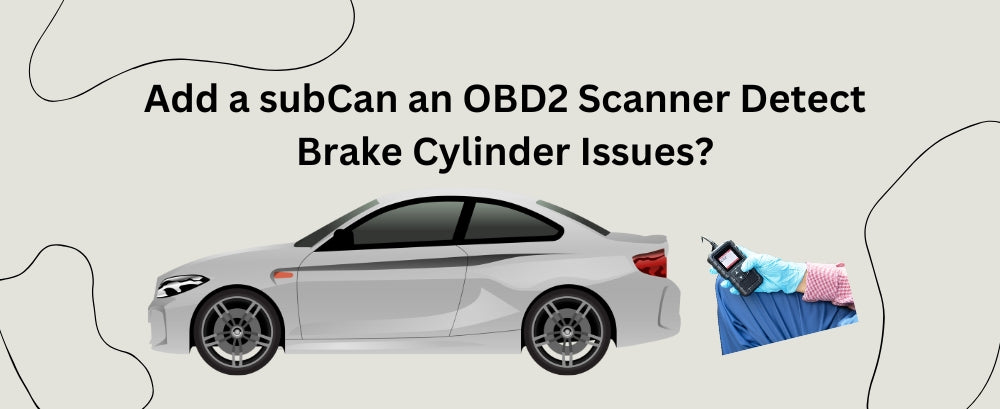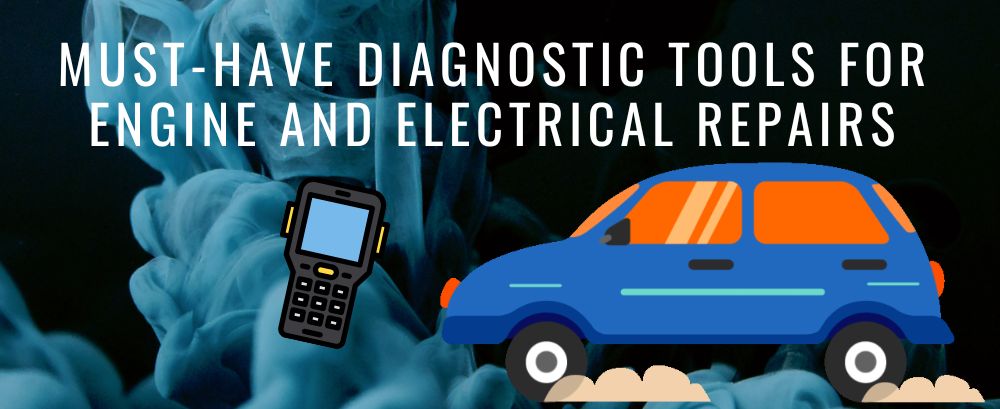If you're like most car owners, that dashboard warning light can be your least favorite surprise. It’s the moment you reach for your trusty OBD2 scanner, like a digital detective, hoping it can point you in the right direction.
But can this nifty device help you figure out if there’s something wrong with your brake cylinder? Spoiler alert: it’s not that simple. Let’s dive into why.
Can an OBD2 Scanner Detect Brake Cylinder Issues?

The short answer: No, it can’t.
An OBD2 scanner is a great tool, but it’s a bit like asking a tech guru to fix your plumbing. OBD2 scanners are designed to monitor the electronic systems in your car—things like engine performance, emissions control, and sensors scattered across the vehicle.
When something goes wrong in these areas, your OBD2 scanner will read the diagnostic trouble codes (DTCs) and help you understand where the problem lies.
However, when it comes to mechanical issues—like a brake cylinder problem—the OBD2 scanner isn’t built for that.
Brake cylinders deal with hydraulic pressure to make sure your car stops when it should, and this is all about mechanics, not electronics.
Unless the issue involves an electronic component like the ABS system (Anti-lock Braking System), the OBD2 scanner won’t be able to help you.
In short, the OBD2 scanner excels at telling you about electrical and sensor-related issues. But when it comes to a brake cylinder leaking or wearing out, it’s not equipped to diagnose the problem.
Brake Cylinder Issues: The Real Culprits Behind the Scenes
So, if an OBD2 scanner can’t detect brake cylinder problems, what kind of issues should you be on the lookout for? Let’s peel back the curtain on what’s really going wrong when your brake cylinder is in trouble.
The brake cylinder is like the heart of your brake system, using brake fluid to create the hydraulic pressure that activates your brakes. When it’s working well, you don’t even think about it. But when it starts to fail, you’re going to notice a few things:
- Brake Fluid Leaks: Over time, the seals in the brake cylinder can wear out, leading to brake fluid leaks. Less fluid means less pressure, which directly impacts your braking power. If your brake pedal feels softer than usual, this could be why.
- Internal Wear: Like anything mechanical, brake cylinders wear out. The internal pistons and seals degrade over time, reducing efficiency. You’ll often notice a delayed response when you press the brake pedal, or you might have to press harder to get the car to stop.
- Air in the Brake Lines: If there’s an issue with the brake cylinder, air might get into the brake lines. And in the hydraulic world, air is a big no-no. It causes your brakes to feel soft or spongy, and your stopping power is greatly reduced.
The bottom line is that brake cylinder issues are mechanical, not electronic, which is why your OBD2 scanner won’t pick up on them. You’ll need a good old-fashioned physical inspection to confirm if something’s wrong.
How to Detect Brake Cylinder Problems the Right Way
If your OBD2 scanner isn’t going to tell you there’s a brake cylinder problem, how do you figure it out? Here are a few ways to go about it:
- Check the Brake Fluid Level: Start by popping the hood and taking a look at your brake fluid reservoir. If the fluid level is low, it might be due to a leak in the system, possibly from the brake cylinder.
- Look for Leaks: Inspect the area around the master cylinder and brake lines. If you see any moisture or fluid accumulation, that’s a clear sign something’s wrong. Brake fluid should stay inside the system, not outside.
- Feel the Pedal: If your brake pedal feels squishy or sinks to the floor before you get any braking action, that’s a red flag. A brake cylinder leak or air in the system could be causing that soft pedal.
- Seek Professional Help: If you suspect there’s a brake cylinder issue, it’s time to see a mechanic. Brakes are not something to gamble with, and a professional can quickly diagnose and fix any issues before they become dangerous.

What Can an OBD2 Scanner Actually Do for Your Car?
While your OBD2 scanner won’t help you with mechanical problems like a bad brake cylinder, it’s still an incredibly useful tool for diagnosing other vehicle issues. The Foxwell NT809TS is a great example of a scanner that offers powerful diagnostic features well beyond the basics.
Here are some things the Foxwell NT809TS can do:
- Reading and Clearing DTCs: This scanner will quickly read and clear trouble codes from your car’s electronic systems. Whether it’s a check engine light or a fuel system issue, the NT809TS has you covered.
- ABS and Airbag Diagnostics: While it can’t detect mechanical brake cylinder issues, the NT809TS can read ABS fault codes and help you diagnose electronic problems in your brake system. It can also scan your airbag system (SRS) to ensure everything is functioning properly.
- TPMS Service: One standout feature is its ability to work with the Tire Pressure Monitoring System (TPMS). The NT809TS can activate and program TPMS sensors, as well as check tire pressure data to help you troubleshoot any tire-related issues.
- Oil Reset and Maintenance: This scanner can reset oil service reminders after an oil change and help you keep track of routine vehicle maintenance. It's perfect for staying on top of your car’s health.
- EPB Calibration: If your car has an electronic parking brake, the NT809TS can help reset and calibrate it after servicing, which is a huge help if you’re doing your own brake work.
- Battery Management System (BMS) Reset: After replacing your battery, the NT809TS will reset the car’s battery management system, making sure all the onboard electronics recognize the new power source.
In short, while an OBD2 scanner like the Foxwell NT809TS won’t solve everything (like mechanical problems), it’s an invaluable tool for diagnosing a wide range of electronic and sensor-related issues in your car.
Conclusion
To wrap things up, your OBD2 scanner is an incredibly handy device for diagnosing your car’s electronic systems, but it’s not magic.
It won’t detect mechanical problems like a brake cylinder failure, but that’s okay! For those issues, a little hands-on inspection or a visit to your mechanic will do the trick.
However, when it comes to sensors, engine codes, and all things electrical, the Foxwell NT809TS is the go-to tool that can save you time, money, and a lot of headaches.
Just remember, no scanner can do it all—sometimes, you’ve got to trust your instincts (and your brake pedal!).
FAQs
Will an OBD2 scanner tell which cylinder is misfiring?
Yes, an OBD2 scanner can identify a misfiring cylinder by reading specific fault codes (like P0300 for random misfires or P0301-P0308 for individual cylinders). It will provide the cylinder number and help you pinpoint the issue.
Will an OBD2 scanner read brake codes?
Yes, but only for electronic systems like ABS (Anti-lock Braking System). It can read brake-related codes if there’s an issue with sensors or electrical components. However, it won’t detect mechanical problems like brake cylinder failure.
What problems can OBD2 detect?
OBD2 scanners can detect a variety of problems related to the car's electronic systems, including engine issues, emissions system faults, sensor malfunctions, ABS errors, airbag (SRS) problems, and more. It’s best suited for electrical diagnostics rather than mechanical issues.




Leave a comment
This site is protected by hCaptcha and the hCaptcha Privacy Policy and Terms of Service apply.